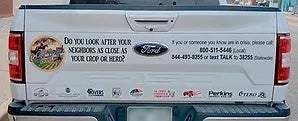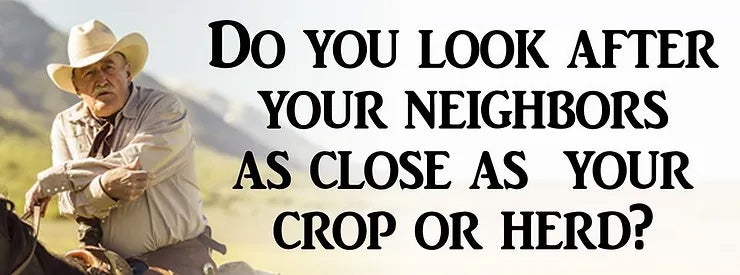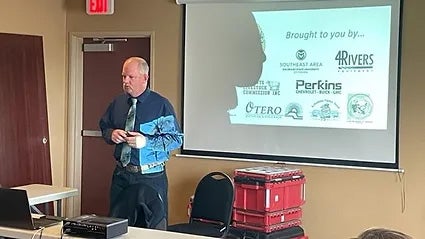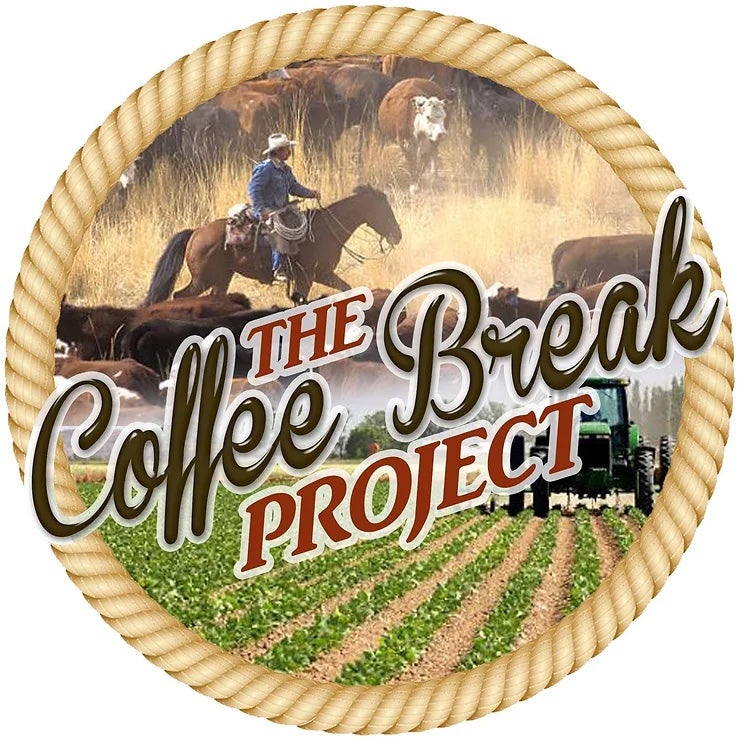(Eads, CO) -- Stroll down the streets of small town Eads, Colorado and you see a lot of quiet and a laid back way of life. It's what you don't see that's been the concern.

You would never know that farmers and ranchers suffer with depression and sadness. They are tough. They are resilient. They go to work and shove the pain aside because that’s just what they do. But they’re human and with the pandemic and other challenges, they are among a large group of people needing support. And when a string of suicides with a four month time period happened, it was time to talk.
Southeast Health Group recognized that and started having conversations about what to do to help the agriculture community. Executive director JC Carrica explained that he first realized the severity of the problem when he learned that the small rural community of Kiowa county had experienced four suicides within a four-month time frame. That’s when he knew they had to do better to reach all communities and approach mental health not as a one-size-fits-all strategy.
The AG Advisory group was started because one message for all people didn’t work anymore, needed to market to farmers, ranchers, ag workers, specific communities, and counties. Many southeast Colorado counties are now assembled to tackle the conundrum of meeting people where they are. Rocky Ford hosts an advisory group with a focus on heroin, homelessness, and hunger while Crowley county’s advisory group is centered around general peer support. Mind Matters is the ag advisory group for Kiowa county, a relatively new group that will meet every six to eight weeks to brainstorm on how to help the community cope with grief, depression, and other mental health needs.
Carrica said they knew that just having the advisory groups wouldn’t be enough to make a difference. They would need to make sure they could remove the stigma of seeking mental health help from this community. They created the slogan, “Do you look after your neighbors as close as your crop or herd?”
“It’s brilliant, it’s concise, it says a lot and creates a lot of conversation. It’s on the back of Carrica’s white truck.


He said it’s not unusual for people to ask him about it. Carrica told the group that a family from Louisiana stopped him in Pagosa Springs wanting to know what it meant. He explained it was a great opportunity to talk about the challenges that the AG community faces with mental health. And he added they try and educate about the stressors that the folks who grow our food face.
“They had no idea the stresses that came with farmers, ranchers, and ag workers. They had understanding of conversations about climate, they didn’t understand how international domestic trade has impact, they didn’t realize the high suicide rate with people in the ag community um they didn’t think about drought, they just didn’t know.”
After a 15-minute conversation they seemed to realize they didn’t know how much work goes into our growing our food.
It’s an important conversation.
The slogan was created four months following the Kiowa county suicide, and then in January of 2019 Governor Jared Polis asked to use the slogan when he hosted mental health proclamation at the capitol. Carrica mentioned it was exciting to get the message out but then it beckoned the question, what would be next?
“What do you do? We didn’t have a product; we had a message.” Carrica furthered. He said they found a product at the University of Colorado that wasn’t in use. It was a model of training that trained in just having a conversation, nothing more. About 170 people have trained so far, traveled across the country to train. Very comfortable and natural model of talking about mental health issues.
The first training happened somewhere very natural for farmers and ranchers, the La Junta Livestock Sale Barn. Carrica said the location helped them remove the stigma and fear for the ag community, a very important piece of training for it to be successful.
The Coffee Break Project called travels to train on how to build advisory groups.
“We figured out how to create grass roots movements in communities that means something to them not the industry telling them what they need to do.”
...we wait until grants are available and then grants, we apply to them, and they tell us what to do. That’s the traditional method on how grants work for organizations."
But with the advisory groups, they ask what’s important and go after what works for the community.
What’s important to the state mental health system may make sense to them but it’s not always the perfect fit for a small southeast Colorado AG community.
Carrica admitted that it’s backward from what we normally see but it works because it’s a good fit for our communities here.
“It’s grassroots driven and then we go after funding or we tell the foundations, that’s not what people want out here, quit telling us what we need, some of it makes sense but why don’t you give us the opportunity to kinda tell you what the people in the community are seeing.”
The funding is starting to make a difference in southeast Colorado. Carrica commented that the funding coming in is creating two job positions within their Veteran’s advisory group. The two positions will represent southeast Colorado and the San Luis Valley. The job will take them to veterans in those communities to talk to Veterans Service officers, the legion halls and talk about what’s available in terms of care. This funding milestone happened in the first year.
“Again, it wasn’t the state or the foundation saying here’s money align with us and go do these things we think will fix you, it’s this is what’s working and they said, we like it and we’re investing in it, kinda a backward model of what we’re used to seeing.”
The advisory groups are culture specific. Veterans, AG workers, or Kiowa county culture or Rocky Ford city culture. It’s not ethnicity or gender, it’s a population of people who get together and want to address a specific need.
Carrica added this model is sustainable and replicable. He said it’s not his idea to take credit for that Northeast Colorado figured this out about 15 years ago. The model comes from researchers who created, COMET™ (Changing Our Mental and Emotional Trajectory) which teaches people how to intervene when they encounter someone who is in a “vulnerable space” and help shift the person’s mental health trajectory back to a place of wellness instead of proceeding towards a mental health crisis. COMET™ helps fill a gap and is a strong complement to other strategies to reduce the suffering resulting from the high levels of stress in rural, agricultural communities.
The program is strong with investors and gatekeepers investing their logo and their time to help ensure its success.
Carrica used the Rocky Ford location as an example of the metamorphosis of the advisory group and the services offered.
Community members were leery of the Rock Ford expansion originally, because of the stigma attached to mental health services.
But now, as Carrica mentioned, they’re seeing improvements to the community from the program. Now ranchers are putting their livestock brands on boards in the building as a way to say they approve and it’s their stamp of approval. Businesses are also putting their logos up as a way to say they’re pleased with the positive impact on the town.
“It’s just keeps growing!”
This is just in a year. People are talking about mental health and well-being. They might not be asking, “are you depressed, but they say how is the weather affecting you?”
We aren’t using traditional mental health language.
The Coffee Break Project is also a safe place to just hang out and be with others. On Monday and Wednesday mornings now in Rocky Ford, you might see people sitting together who might not have before. The free coffee and doughnuts bring them in, and amazing things happen. It's become a location where community members of all socio-economic standing, who wouldn't normally gather in the same place, now sit comfortably for regular meetings at the locations.
Organically a person starts to feel more connected to their community and if they feel like they have a purpose they’ll accept services because they feel that people care about them.


The efforts to form community advisory groups are on-going in Southeast Colorado. If you’d like to learn more about how you can be involved, contact Hanna Bates, Agricultural Outreach Coordinator at 719-363-1596 or you can email her at hbates@shgco.org


